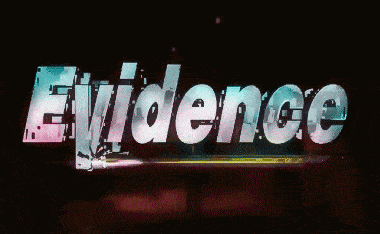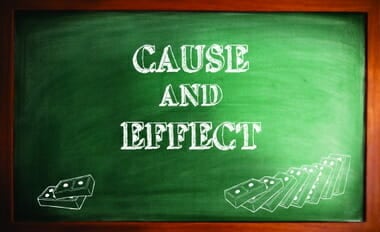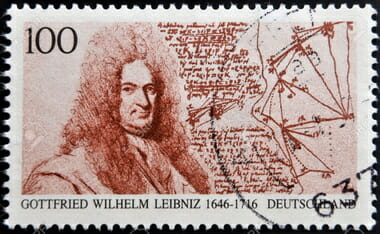I think that the first premise, that whatever begins to exist has a cause, is virtually undeniable for any sincere seeker after truth. For something to come into being without any cause whatsoever would be to come into being from nothing. That is surely impossible. Let me give three reasons in support of this premise:
1) Something Cannot Come from Nothing. To claim that something can come into being from nothing is worse than magic. When a magician pulls a rabbit out of a hat, at least you’ve got the magician, not to mention the hat! But if you deny premise 1, you’ve got to think that the whole universe just appeared at some point in the past for no reason whatsoever. But nobody sincerely believes that things, say, a horse or an Eskimo village, can just pop into being without a cause.
This isn’t rocket science. In The Sound of Music, when Captain Von Trapp and Maria reveal their love for each other, what does Maria say? “Nothing comes from nothing; nothing ever could.” We don’t normally think of philosophical principles as romantic, but Maria was here expressing a fundamental principle of classical metaphysics. (No doubt she had been well trained in philosophy at the convent school!)
Sometimes skeptics will respond to this point by saying that in physics subatomic particles (so-called “virtual particles”) come into being from nothing. Or certain theories of the origin of the universe are sometimes described in popular magazines as getting something from nothing, so that the universe is the exception to the proverb “There ain’t no free lunch.”
This skeptical response represents a deliberate abuse of science. The theories in question have to do with particles originating as a fluctuation of the energy contained in the vacuum. The vacuum in modern physics is not what the layman understands by “vacuum,” namely, nothing. Rather in physics the vacuum is a sea of fluctuating energy governed by physical laws and having a physical structure. To tell laymen that on such theories something comes from nothing is a distortion of those theories.
Properly understood, “nothing” does not mean just empty space. Nothing is the absence of anything whatsoever, even space itself. As such, nothingness has literally no properties at all, since there isn’t anything to have any properties! How silly, then, when popularizers say things like “Nothingness is unstable” or “The universe tunneled into being out of nothing”!
When I first published my work on the kalam cosmological argument back in 1979, I figured that atheists would attack premise 2 of the argument, that the universe began to exist. But I didn’t think they’d go after premise 1. For that would expose them as people not sincerely seeking after truth but just looking for an academic refutation of the argument.
What a surprise, then, to hear atheists denying premise 1 in order to escape the argument! For example, Quentin Smith of Western Michigan University responded that the most rational position to hold is that the universe came “from nothing, by nothing, and for nothing”—a nice close to a Gettysburg Address of atheism, perhaps!
This is simply the faith of an atheist. In fact, I think this represents a greater leap of faith than belief in the existence of God. For it is, I repeat, literally worse than magic. If this is the alternative to belief in God, then unbelievers can never accuse believers of irrationality, for what could be more evidently irrational than this?
2) If Something Can Come into Being from Nothing, Then It Becomes Inexplicable Why Just Anything or Everything Doesn’t Come into Being from Nothing. Think about it: Why don’t bicycles and Beethoven and root beer just pop into being from nothing? Why is it only universes that can come into being from nothing? What makes nothingness so discriminatory? There can’t be anything about nothingness that favors universes, for nothingness doesn’t have any properties. Nor can anything constrain nothingness, for there isn’t anything to be constrained!
I’ve heard atheists respond to this argument by saying that premise 1 is true of everything in the universe but not of the universe. But this is just the old taxicab fallacy that we encountered in chapter 3. You can’t dismiss the causal principle like a cab once you get to the universe! Premise 1 is not merely a law of nature, like the law of gravity, which only applies in the universe. Rather it’s a metaphysical principle that governs all being, all reality.
At this point the atheist is likely to retort, “All right, if everything has a cause, what is God’s cause?” I’m amazed at the self-congratulatory attitude of students who pose this question. They imagine that they’ve said something very important or profound, when all they’ve done is misunderstand the premise. Premise 1 does not say that everything has a cause. Rather it says that everything that begins to exist has a cause. Something that is eternal wouldn’t need a cause, since it never came into being.
Ghazali would therefore respond that God is eternal and uncaused. This is not special pleading for God, since this is exactly what the atheist has traditionally said about the universe: It is eternal and uncaused. The problem is that we have good evidence that the universe is not eternal but had a beginning, and so the atheist is backed into the corner of saying the universe sprang into being without a cause, which is absurd.
3) Common Experience AND Scientific Evidence Confirm the Truth of Premise 1. Premise 1 is constantly verified and never falsified. It’s hard to understand how anyone committed to modern science could deny that premise 1 is more plausibly true than false in light of the evidence.
So I think that the first premise of the kalam cosmological argument is clearly true. If the price of denying the argument’s conclusion is denying premise 1, then atheism is philosophically bankrupt.
William Lane Craig, On Guard: Defending Your Faith with Reason and Precision (Colorado Springs, CO: David C. Cook, 2010), 75-78.













